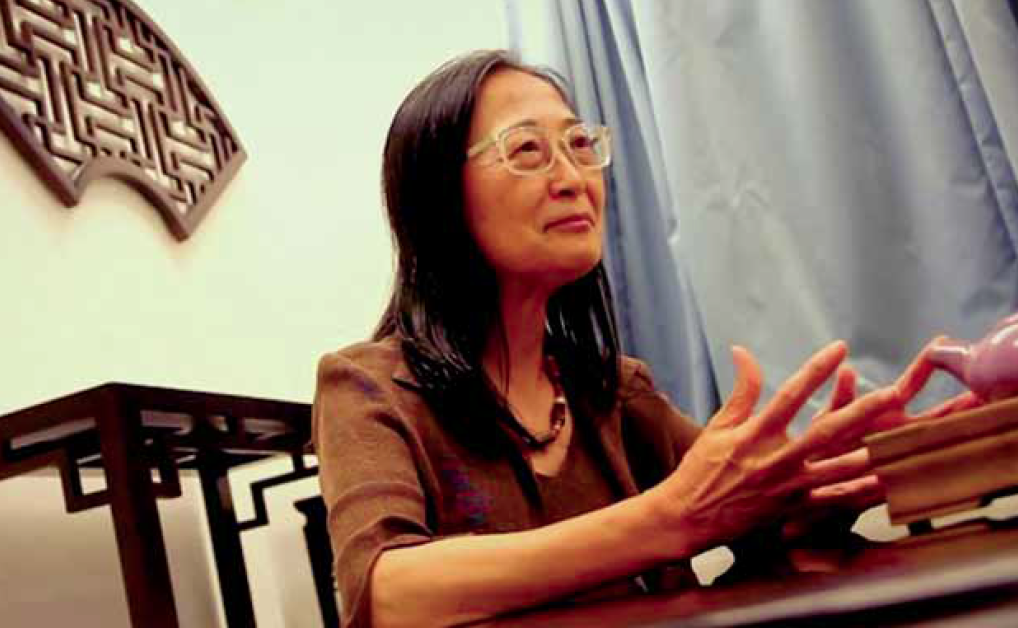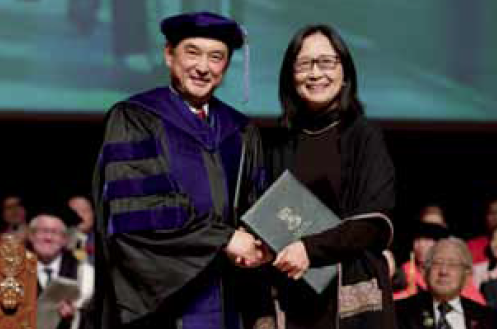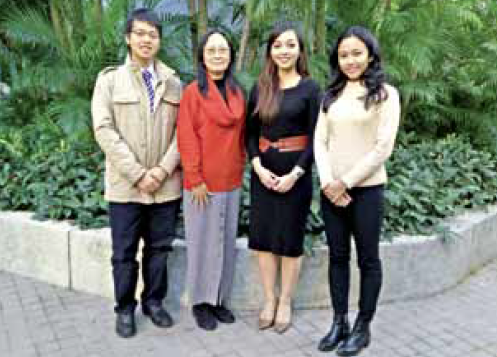© Hong Kong Academy of Medicine. CC BY-NC-ND 4.0
DOCTOR FOR SOCIETY
The vanguard of integrative medicine: Dr Vivian Wong Taam’s visionary work in evolving Hong Kong’s healthcare paradigms
Zareen Chiba, KS Eu, Edward Tam
Year 3, Faculty of Medicine, The University of Hong Kong
The work of visionaries is often sown into society
generations before the profound results are
appreciated. This is often the case when these
contributions are ahead of their time. Dr Vivian Wong Taam, at first glance, is a motherly figure with
a piercing visage, who does not openly proclaim the
multitude of contributions she has amassed that
range from Chief Executive of the Hospital Authority
(HA), Public Health Specialist of The World Bank,
Chairman of the Safe Motherhood Initiative
of International Federation of Obstetricians &
Gynecologists, and current Chairman of Friends of
the Earth (HK).
A Fellow of three Colleges (FRCOG, FFH,
FRCP), her claim to fame was discovering the
perinatal transmission of hepatitis B, paving the way
for prevention of liver cancer in the next generation.
Another lesser-known fact is that Dr Wong was
instrumental to the founding of the local Prenatal
Diagnosis Service at Tsan Yuk Hospital (TYH) and
pioneering thalassaemia research. Nonetheless,
her métier has been to impeach the dichotomy of
traditional versus western medicine, and in its stead
vitalise the role of integrative medicine using policy
and practice.
The Eureka moment
It was in the vestiges of the Cultural Revolution when
Dr Wong, as a resident at TYH, was inspired by the
philosophies of traditional Chinese medicine (TCM)
practitioners (in particular acupuncture) and began
her academic contributions to integrative medicine.
Conducting the first randomised controlled trial for
comparison of intravenous oxytocin with electrical
acupuncture stimulation, she demonstrated that
both were equally effective in the induction of
labour. Nonetheless, “the climate was not right
for Chinese Medicine. The paper could not be
published—we were too much ahead of time.” This
heralded a Eureka moment, calling to question
whether scientific documentation and trials of the
practice of TCM could be standardised. Dr Wong,
in her capacity as Chief Executive of Queen Mary
Hospital 20 years later (and subsequently the HA’s
Director of Professional Services and Advisor in
Integrative Medicine) would go on to establish the
Research Ethics Committees across all clusters in
HA, covering both dichotomies of medicine. By
using the ‘evidence-based medicine’ approach for the
two, TCM clinical trials were ensured to be subject
to the same standards of ethics and care as western
medicine, heightening the public perception of TCM
and integrative medicine through the years. For this
she has inaugurated an endowed professorship in
integrative medicine to her name.
“A Collaborative Approach”
Touting the philosophy of 醫、教、研 (to heal,
teach, and research), Dr Wong played a crucial role
in building a tripartite model of modernisation
and collaboration for Chinese medicine. With the
establishment of one Chinese Medicine Centre for
Training and Research (CMCTR) in each of the 18
local districts, graduates of three local universities
are provided with a formal clinical training in Hong
Kong, with scholarships for ancillary training in
China. In her tenure as President of the Hong Kong
Association for Integration of Chinese-Western
Medicine (香港中西醫結合醫學會), Chinese medical practitioners themselves benefitted under the
organised structured instruction of the bases of
primary care western medicine. Withal, to combat
the great concern of drug-herb interaction, the HA
has, under her strong guidance, established a drug-herb interaction database available on the electronic
Knowledge Gateway, inadvertently sparing
morbidity, mortality and raising the standard of
personalised care. Her uncomplicated motivation
for the above work was that “If we do not integrate
TCM with our practice, the patients will integrate it
themselves.”
Ethnopharmacological endeavours 地道藥材
Her work on Rural Health Manpower Development
and Maternal & Child Health under WHO, UNICEF
and World Bank projects, culminated in the
improvement of rural healthcare, ethnopharmacy,
women’s rights and women’s education in China. She
described with fervour her work 25 years ago for the 30
poorest counties in China, refining systems that were
in place and founding them when there were none.
She laboured to upgrade rudimentary healthcare
facilities and developed geopolitically relevant
training material, with a pan-climatic emergency call
and transport method. Dr Wong vividly depicted
the challenges in replacing the ‘barefoot doctor’
by empowering village girls with only 9 years of
education, to become birth attendants and village
doctors. These contributions would trickle down to
future generations of rural populations in the quest
for modernised healthcare and equal opportunity.
On this tangent, she cites the term
‘ethnopharmacology’ and its application in the
context of rural healthcare: a notion that encompasses
culture, ecology, and anthropological pharmacy.
This exemplified the fluidity that characterises
TCM, which has become a firm representation of
holistic care and cultural integration. Those without
the means have to adapt to whatever resources
available locally, fortifying the relevance of ‘local
herbal pharmacology’, personalised medical care
and interprofessional work in today’s healthcare
paradigm.
Beyond boundaries
Aside from her substantial career, Dr Wong has
never lacked energy, evident to this day in her
enduring involvement in advocacy work. Dr Wong
also crosses boundaries of different media and target
audience in health education. Her current ventures
include a tri-weekly column in Hong Kong Economic
Journal and a weekly RTHK talk show 精靈一點: 中醫循證醫學, flexing the public’s mind beyond
their preconceived notions of healthcare to embrace
everyday applications of Chinese medicine. Not
constrained by the boundaries of her profession,
she is also an enthusiast of environmental work,
and is currently the elected Chairperson of
Friends of the Earth (HK), a locally based charitable
organisation active in environmental campaigns
and education, all while maintaining a brimming
schedule for family time, and to be an athlete and an
aesthete of the performing arts.
She imparts to us a final lesson, one that she
has consistently demonstrated during her life. “Start
dreaming and you’ll see things differently. Be open-minded and allow yourself to dream. Things that you
don’t know may still exist; you just haven’t found it
yet”.
For the first HKMJ issue of 2015, we have been
taken on an odyssey of four decades of medical
inspiration, and arrive in a century interconnected
and globalised like no other. Dr Vivian Wong’s
conviction that “the medicine of the twenty-first
century is integrative medicine” may well be
predictive of the pivotal shifts in UN developmental
frameworks and healthcare goals to come. Only
time will tell if her visions will be embraced
wholeheartedly in the timbre of medical practice and
the public voice.
Find HKMJ in MEDLINE:




